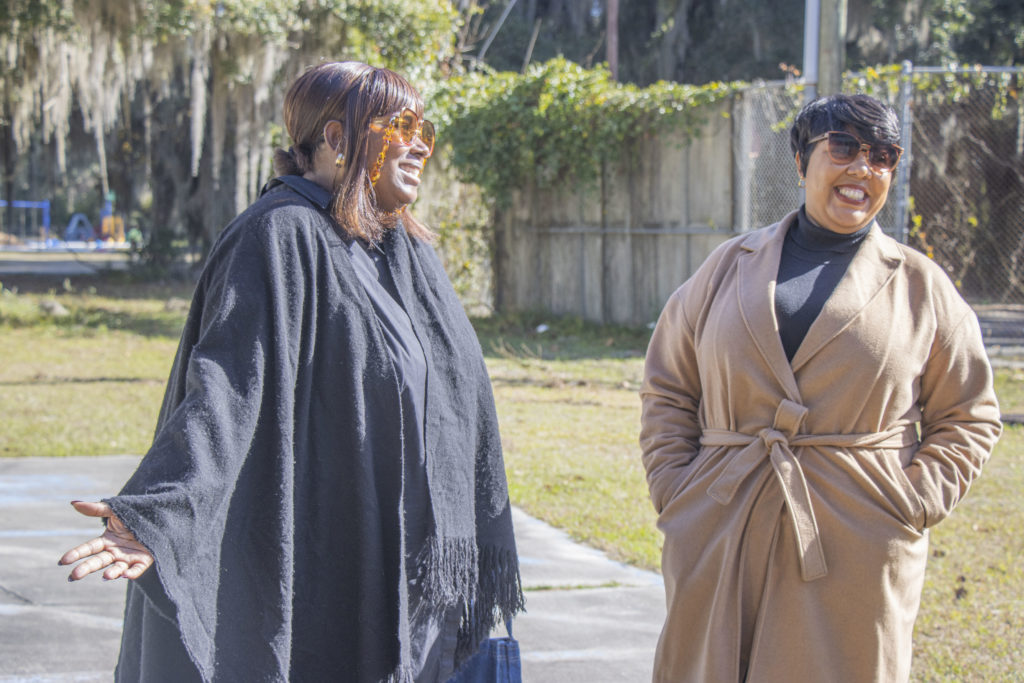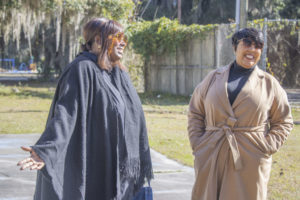Culture and Community partnership with Penn Center begins offering public programs


A partnership between the Willson Center and South Carolina’s Penn Center is kicking off a suite of programs this spring that will include community conversations, artists-in-residence, and on-site classes and workshops with students and faculty from colleges and universities across the Southeast. The partnership project, Culture and Community at the Penn Center National Historic Landmark District, is funded by a $1 million 2021 grant to the Willson Center by The Andrew W. Mellon Foundation.
Located on St. Helena Island, one of the South Carolina Sea Islands, Penn Center is a nonprofit organization committed to African American education, community development and social justice. It also serves as a gathering place for meetings, educational institutions and planning activities within the Sea Island Gullah Geechee communities. The partnership is led by Barbara McCaskill, professor of English and associate academic director of the Willson Center, and Nicholas Allen, who holds an endowed chair in humanities and directs the Willson Center. A full-time research coordinator, Angela Dore, provides on-site, day-to-day oversight of the project and its programs.
Two Penn Center Community Conversations are planned for the spring. A discussion on “Heirs’ Property: Land, Culture, and Community” will be presented online at a date to be announced shortly. The event, originally scheduled for Feb. 19, is being reorganized due to ongoing public health concerns and will be presented online. A second conversation, “Sacred Spaces: The Penn Center, Belief and Belonging,” is scheduled for Apr. 30. The conversations are also presented as part of the Willson Center’s 2022 Global Georgia public events series.
The first of a series of annual artist residencies will be held by Anina Major and Tamika Galanis, who will collaborate on an installation during the spring that will be presented in June 2022. Galanis and Major, both from The Bahamas and based in Durham, NC and New York City, respectively, are multimedia artists whose work interrogates popular conceptions of place: Major’s through investigating “the relationship between self and place as a site of negotiation,” and Galanis’s by examining “the complexities of living in a place shrouded in tourism’s ideal during the age of climate concerns.”
The two artists made their first visit to Penn Center in December 2021 to introduce themselves to its unique surrounding environment and culture. “Our introductory week at the Penn Center and on St. Helena Island was transformative for me,” Galanis said. “It was the opportunity for ideas that we knew to be true in spirit alone up to that point to materialize – through fellowshipping with the community; grounding ourselves in the actual landscape; and getting really excited about the idea of an exchange between the two cultures, and what that would look like or mean.”
Galanis and Major’s work will be on display at Penn Center in time for the project’s first set of student research residencies, which will convene on the Penn campus in early June. Place-based studies will be embedded in classes offered at UGA and regional partner institutions, including Historically Black Colleges and Universities. On-site workshops will also be held during the residency period. Classes and workshops for 2022 include:
- “Pick[ing] up a camera” and Capturing Truths about Race, the Environment, and Social Justice, Dr. Valerie Frazier, College of Charleston
- Black Food Geographies, Dr. Nik Heynen, UGA (Course offered through Heynen’s residency at Spelman College)
- Land as Liberation in the African American Freedom Struggle, Dr. Barbara McCaskill, UGA
- Workshop on the Fifteenth Amendment, Dr. Charles Johnson, Retired Vice President for External Affairs and General Counsel, Tuskegee University
- Workshop on Liberation Farming, Indigo and Community Economic Development, Maurice Bailey, Director of Save Our Legacy Ourself (SOLO), Hog Hammock, Sapelo Island; Dr. Nik Heynen, UGA
“This project presents such a marvelous opportunity for academic institutions and scholars to engage tangibly with history, community, and culture,” said Dore, the research coordinator. “It elevates and advances the instruction that students receive in the arts and humanities, while promoting the stewardship of natural resources and cultural preservation. I’m looking forward to seeing these programs in action this year, and for years to come.”
